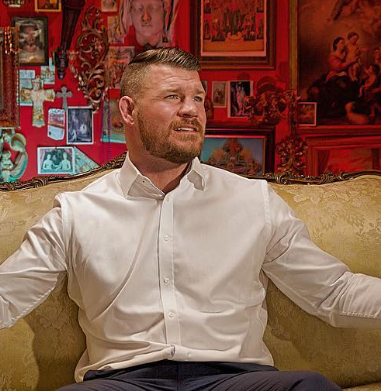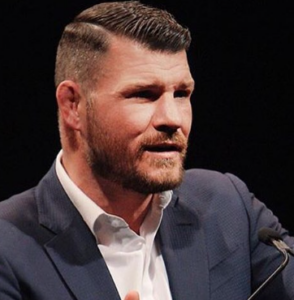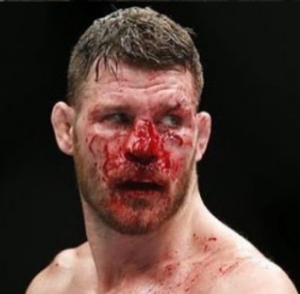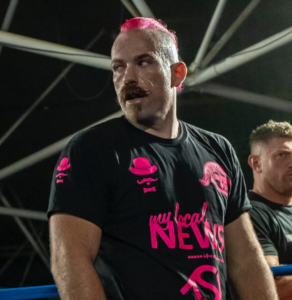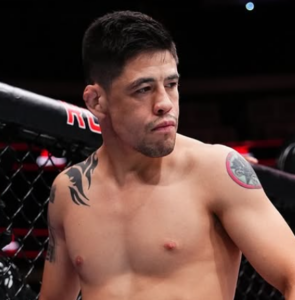Michael Bisping’s journey from a fighter with limited vision to a UFC champion is a tale of resilience, courage, and unwavering determination. His achievements inside and outside the Octagon have made him a legend in the sport.
Whether as a fighter, commentator, actor, or advocate, Bisping continues to inspire and leave a lasting impact on the world of MMA.
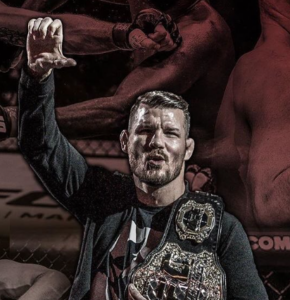
Also Read: Michael Bisping Sees Two of His Impressive, Lesser-Known Records Broken in One Event
Also Read: Colby Covington Defends Joe Rogan: The Bold Stand That Sparked Debate Amid Controversy
Michael Bisping Achieved the Impossible with Limited Vision
The story of Michael Bisping’s rise to the top of the UFC middleweight division is one of resilience, grit, and determination.
His journey from a fighter with a compromised vision to the pinnacle of the sport is an inspiring tale of overcoming adversity.
Despite losing his eyesight in one eye during a controversial fight against Vitor Belfort, Bisping achieved what many deemed impossible. Let’s delve deeper into this remarkable journey.
In 2013, Bisping faced Vitor Belfort in a highly anticipated middleweight bout. Belfort, known for his explosive power, was on testosterone replacement therapy (TRT) at the time—a treatment later banned by the UFC. During the fight, Belfort landed a devastating head kick that detached Bisping’s retina.
The injury rendered Bisping blind in his right eye, a handicap that would have ended most fighters’ careers.
However, Bisping’s resolve and love for the sport drove him to adapt and continue competing.
Concealing the Impairment
Fighting with impaired vision in a sport as unforgiving as mixed martial arts posed significant challenges. To pass medical examinations, Bisping had to conceal the extent of his injury.
He trained himself to rely more on his left eye, enhancing his peripheral vision and reflexes. It was a risky gamble, but one that paid off as he continued to climb the middleweight rankings.
In June 2016, Bisping’s moment of destiny arrived. Middleweight champion Luke Rockhold was set to defend his title at UFC 199, but an injury to the original challenger opened the door for Bisping.
Despite being given just 17 days’ notice, Bisping jumped at the opportunity. He had already faced Rockhold two years earlier, suffering a submission loss. The odds were heavily stacked against him, with few believing he could pull off the upset.
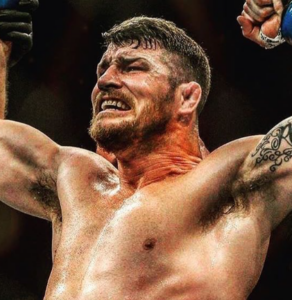
Michael Bisping: Transitioning to Commentary and Acting
Post-retirement, Bisping seamlessly transitioned into a successful career as a UFC commentator and analyst.
His sharp wit and deep understanding of the sport made him a fan favorite on broadcasts.
Additionally, he pursued acting, appearing in films like “xXx: Return of Xander Cage” and “Den of Thieves.” Bisping’s ability to reinvent himself outside the Octagon demonstrated his versatility and determination.
Bisping’s journey has also made him a vocal advocate for fighter safety and stricter regulation of performance-enhancing drugs (PEDs) in MMA.
His experience with Belfort—who was on TRT during their fight—highlighted the dangers of PEDs in combat sports. Bisping has used his platform to call for stricter drug-testing policies and greater transparency in the sport.
View this post on Instagram
Writing His Memoir
In 2019, Bisping released his memoir, “Quitters Never Win: My Life in UFC.” The book chronicles his journey from a working-class upbringing in Clitheroe, England, to becoming the first British UFC champion.
It offers an honest and inspiring look at his struggles, triumphs, and unwavering belief in himself. The memoir received widespread acclaim for its candid storytelling and motivational message.
Bisping’s success has had a profound impact on British MMA. As the first fighter from the UK to win a UFC championship, he paved the way for future generations of British fighters.
Stars like Leon Edwards and Arnold Allen have credited Bisping as a source of inspiration. His achievements have elevated the profile of MMA in the UK, fostering a growing fan base and talent pool.
Also Read: Paddy Pimblett’s Victory Over King Green: MMA Pros React to the Unfortunate Incident
